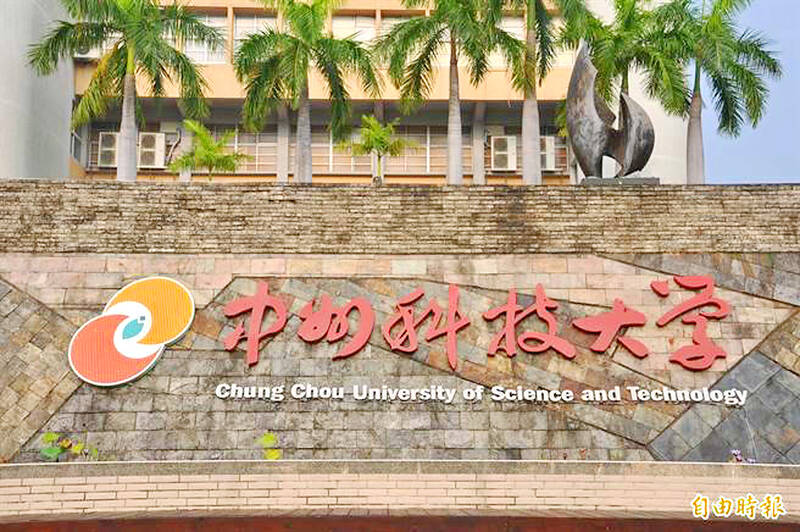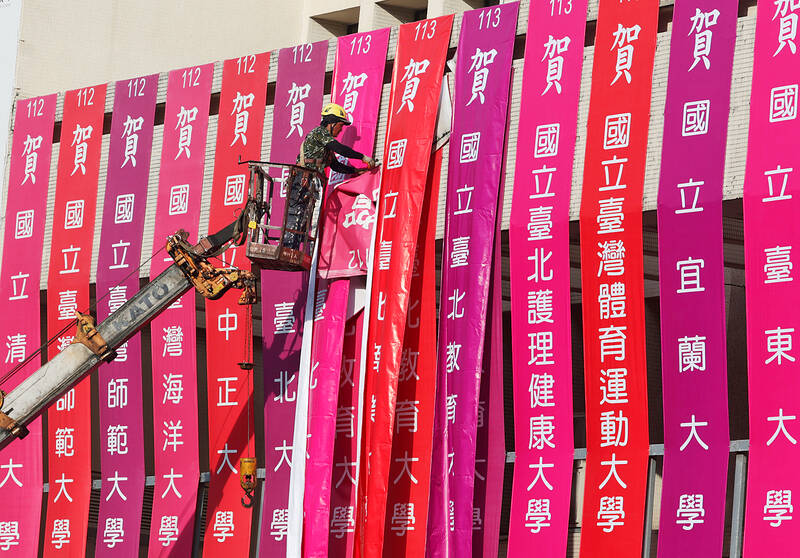The Ministry of the Interior’s acquisition of a property last week under the now-closed Chung Chou University of Science and Technology marked the first such transfer to the government for alternative uses.
The property, including 60,745m2 of land and 12 buildings, was valued at NT$2.36 billion (US$74.48 million) and transferred to the ministry on Tuesday last week.
The property is likely to be used by the reservist forces and the Quick Response Forces under the Second Special Police Corps, it said.

Photo: Taipei Times
Ministry of Education’s Department of Technological and Vocational Education Deputy Director-General Ko Chin-wei (柯今尉) on Friday said that the board of the foundation that owns the building, eponymous with the school, had been disbanded by ministry order and replaced with an interim board formed by faculty and experts on July 31 last year.
The ministry said it is planning to use the property to provide self-defense and self-help classes and training on other defense-related affairs.
The ministry said it would continue to work with the interim board of the school to handle its properties and other assets.

Photo: CNA
In other news, the Ministry of Education (MOE) on Friday said the nation’s declining birthrate continues to affect the education sector, citing 47 schools’ opting to have the ministry “reserve” 3,171 student recruitment slots for the next academic year.
The MOE said that junior colleges and universities have “reserved” more than 50,000 recruitment slots with the ministry over the past three years, but only 1 percent of that reserved amount, about 500, has been redeemed.
Reserved recruitment slots mean there is a gap between the number of students an institution is allowed to enroll and the number it could enroll, meaning fewer than expected students are admitted.
Starting from 2014, the MOE has allowed schools to keep a certain number of ministry-approved quotas for student recruitment “in reserve”; for instance, schools allowed to recruit 100 students but assessed that they could only recruit 60 can “reserve” 40 student recruitment slots for later use.
The MOE said that while the recruitment slots remain “reserved” with the ministry, universities nationwide are reporting decreased enrollment.
Public universities have reserved 163 slots this year, while private universities reserved 452 slots, and 31 science and technology universities reserved 2,756, the ministry’s latest statistics showed.
Public universities reserved 334 slots this year, they showed, but the number is expected to rise to 520 in the next academic year, marking a record high.
On the other hand, private universities saw 5,564 reserved slots this year, but the number is expected to drop to 2,851 next year, the ministry said.

Taiwan has received more than US$70 million in royalties as of the end of last year from developing the F-16V jet as countries worldwide purchase or upgrade to this popular model, government and military officials said on Saturday. Taiwan funded the development of the F-16V jet and ended up the sole investor as other countries withdrew from the program. Now the F-16V is increasingly popular and countries must pay Taiwan a percentage in royalties when they purchase new F-16V aircraft or upgrade older F-16 models. The next five years are expected to be the peak for these royalties, with Taiwan potentially earning

POSITIVE DEVELOPMENT: Japan and the US are expected to hold in-depth discussions on Taiwan-related issues during the meeting next month, Japanese sources said The holding of a Japan-US leaders’ meeting ahead of US President Donald Trump’s visit to China is positive news for Taiwan, former Japan-Taiwan Exchange Association representative Hiroyasu Izumi said yesterday. After the Liberal Democratic Party’s landslide victory in Japan’s House of Representatives election, Japanese Prime Minister Sanae Takaichi is scheduled to visit the US next month, where she is to meet with Trump ahead of the US president’s planned visit to China from March 31 to April 2 for a meeting with Chinese President Xi Jinping (習近平). Japan and the US are expected to hold in-depth discussions on Taiwan-related issues during the

‘LIKE-MINDED PARTNER’: Tako van Popta said it would be inappropriate to delay signing the deal with Taiwan because of China, adding he would promote the issue Canadian senators have stressed Taiwan’s importance for international trade and expressed enthusiasm for ensuring the Taiwan-Canada trade cooperation framework agreement is implemented this year. Representative to Canada Harry Tseng (曾厚仁) in an interview with the Central News Agency (CNA) said he was increasingly uneasy about Ottawa’s delays in signing the agreement, especially as Ottawa has warmed toward Beijing. There are “no negotiations left. Not only [is it] initialed, we have three versions of the text ready: English, French and Mandarin,” Tseng said. “That tells you how close we are to the final signature.” Tseng said that he hoped Canadian Prime Minister Mark Carney

STAY IN YOUR LANE: As the US and Israel attack Iran, the ministry has warned China not to overstep by including Taiwanese citizens in its evacuation orders The Ministry of Foreign Affairs (MOFA) yesterday rebuked a statement by China’s embassy in Israel that it would evacuate Taiwanese holders of Chinese travel documents from Israel amid the latter’s escalating conflict with Iran. Tensions have risen across the Middle East in the wake of US and Israeli airstrikes on Iran beginning Saturday. China subsequently issued an evacuation notice for its citizens. In a news release, the Chinese embassy in Israel said holders of “Taiwan compatriot permits (台胞證)” issued to Taiwanese nationals by Chinese authorities for travel to China — could register for evacuation to Egypt. In Taipei, the ministry yesterday said Taiwan